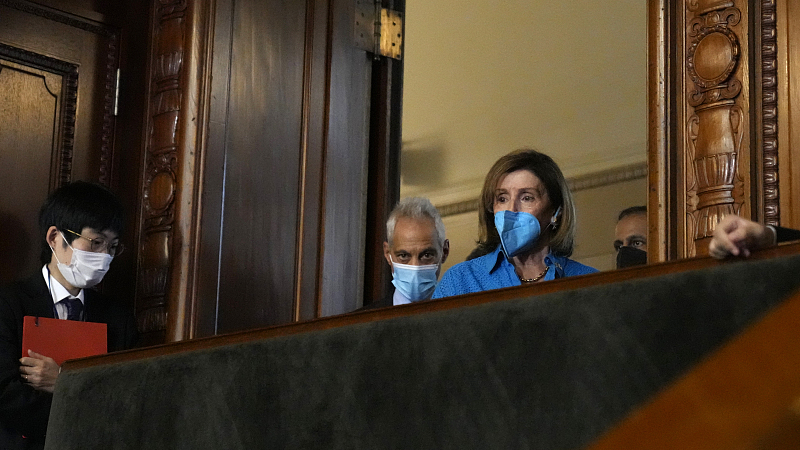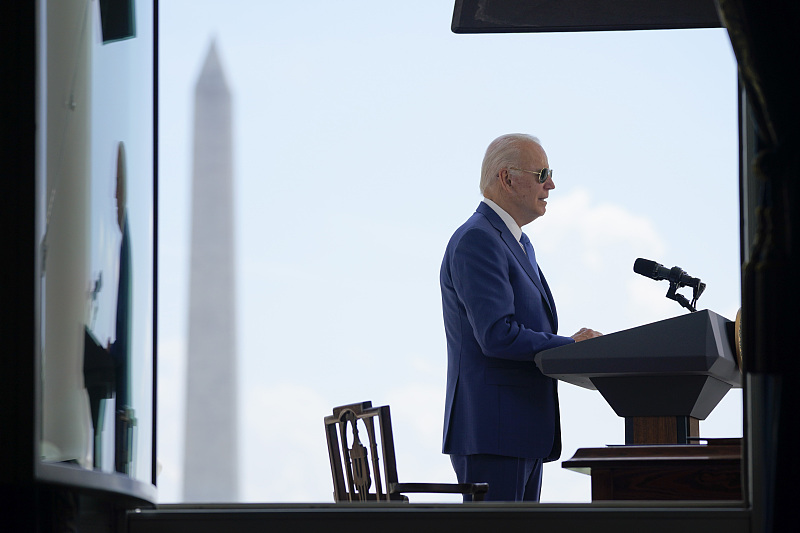
U.S. House Speaker Nancy Pelosi visits the plenary session of the lower house in Tokyo, Japan, August 5, 2022. /CFP
U.S. House Speaker Nancy Pelosi visits the plenary session of the lower house in Tokyo, Japan, August 5, 2022. /CFP
Editor's note: Radhika Desai is a professor of political studies at the University of Manitoba in Canada. The article reflects the author's opinions and not necessarily the views of CGTN.
Other than a silly week of sound and fury, what did U.S. House Speaker Nancy Pelosi accomplish with her ill-advised and ill-timed visit to China's Taiwan region?
Pelosi's Taiwan visit was no personal decision on her part. High-ranking officials like her take few "personal" decisions. She is second in the line of Presidential succession. She belongs to the same party as Biden and to the same neoconservative faction with close ties to the U.S.'s vast military industrial complex.
Meanwhile, U.S. President Joe Biden did nothing to prevent her visit, confining himself to reporting the Pentagon's alleged displeasure, in all probability to leave open an escape hatch, while there was cross-party praise for the Speaker after her visit was concluded.
If the aim was to provoke Beijing into a reckless response, it failed. In the face of a gratuitous crossing of its reddest of red lines - the one-China principle that even the U.S. still officially acknowledges - the Chinese government acted as a model of restraint, by confining itself to strong verbal condemnations and following up with military exercises that leave Taiwan authorities in little doubt that allowing Washington and Pelosi to destabilize the status quo will go nowhere.
If the U.S. aim was to aid Taiwan secessionists - that failed as well. Polls have disclosed that large majorities of people in Taiwan considered her visit as destabilizing. Many people demonstrated outside her hotel, chanting, in a time-honored fashion, "Yankee, Go Home!" The visit can only shrink the secessionist position to a smaller and less influential minority.
The purpose could certainly not have been to aid Taiwan. For decades, by arming Taiwan, Washington was serving the interests of the irresponsible elites, giving the false impression that the U.S. will "defend" Taiwan militarily. President Biden has recently endorsed this idea. But it would be both dangerous and foolish for Taiwan's elites to take his words seriously.

U.S. President Joe Biden speaks before signing two bills aimed at combating fraud in the COVID-19 small business relief programs at the White House in Washington, D.C., August 5, 2022. /CFP
U.S. President Joe Biden speaks before signing two bills aimed at combating fraud in the COVID-19 small business relief programs at the White House in Washington, D.C., August 5, 2022. /CFP
Indeed, given the high levels of trade and investment relations, not to mention cultural and social integration between the Chinese mainland and the Taiwan region, the U.S. driving a wedge between them can only be malicious and seen as such.
What of the Biden administration's top priority to rally "democracies" of the world around its agenda? Judging by the recently released Group of Seven (G7) Foreign Ministers' joint statement, this has comprehensively failed. Yes, it repeated some of the U.S.'s meddling rhetoric about Chinese "threats."
Nonetheless, it also underlined the very one-China policy that the U.S. has been pulling away from with its recent actions, capped by Speaker Pelosi's visit.
Neither the U.S.'s European nor its East Asian allies can contemplate worsening relations with Beijing with equanimity: Their economic and security interests in China, their business relations with it, and their interests in stability and peace in the region, are far greater than those of the U.S.
Since none of these outcomes was unforeseen, apart from Pelosi's long record of vainglorious and self-aggrandizing conduct, there are only two reasons for the U.S. state's actions, neither of which shed a flattering light on it.
The first is simple: war-hawk politicians cannot get elected by an electorate averse to war at least since Vietnam unless they have lots of money to create and spread the disinformation that is a staple of U.S. elections. For money on such a scale, the vast military industrial complex is very critical for them.
Additionally, the U.S. is stuck in a foreign policy rut. Since the early 20th century, it has sought to subject the world to its form of increasingly unproductive and financially speculative capitalism.
Today, as more parts of the world are turning against this sort of capitalism's offer and U.S. power is declining, Washington intends to provoke enemies, but they will not prevail. This can only lead to further conflicts, which can spiral out of control.
Just when the U.S.'s attempt to undo the verdict of the disastrous withdrawal from Afghanistan on its military and intelligence capabilities through a proxy war on Russia is getting unravelled with increasing signs of strained relations with its Ukrainian proxies, the Biden administration has provoked its far greater Chinese adversary. Only Beijing's restraint and wisdom can prevent the worst case scenario from happening.
(If you want to contribute and have specific expertise, please contact us at opinions@cgtn.com. Follow @thouse_opinions on Twitter to discover the latest commentaries on CGTN Opinion Section.)

